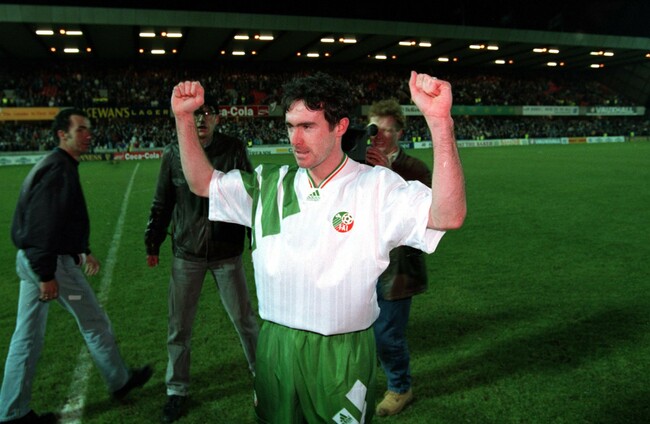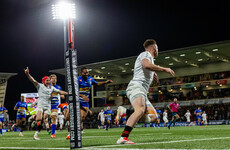ALAN MCLOUGHLIN may have been born in Manchester, but he was very much a proud Irishman.
The midfield star, whose death at 54 was announced today, came of age at the apex of the Jack Charlton era.
He was part of the squad for two World Cups — Italia ’90 and USA ’94 — amid an era of unprecedented heights for the Irish team.
Partially due to their great success, the team’s English-born players were unfairly maligned by some critics as ‘Plastic Paddies,’ while Northern Ireland boss Billy Bingham labelled them “mercenaries”.
For all their evident commitment to the cause, it was true that certain squad members did not necessarily dream of representing Ireland when growing up, but not so in the case of McLoughlin, who had turned down an England B call-up in favour of an opportunity with the Ireland B team.
It did not stop some people from unfairly questioning his Irishness. McLoughlin was particularly hurt by comments attributed to Roy Keane in the Man United legend’s autobiography.
In relation to the famous 1994 World Cup qualifier against Northern Ireland, the following line appeared: “Knowing little of the history, lads like Andy Townsend, John Aldridge, Tony Cascarino and Alan McLoughlin were puzzled.”
In his brilliant and acclaimed book, ‘A Different Shade of Green,’ McLoughlin debunked this claim and explained that he was in fact well aware of the nation’s history, revealing that Keane subsequently rang him to apologise, effectively blaming ghostwriter Eamon Dunphy for the oversight.
He later told The42 in an interview: “My parents are both Irish. I could just as easily have moved to England when I was younger and picked up an English accent. I was proud to play for Ireland and how dare anyone suggest I wasn’t as proud and that I should have been born in Ireland.”
McLoughlin on numerous occasions vividly recalled that remarkable night in Belfast when he etched his name into the history books with one moment of magic.
The match took place at the height of the Troubles, with several atrocities occurring in the weeks leading up to the vital qualifier, in which Ireland needed at least a point to secure their qualification for the 1994 World Cup.
There was talk of the match being postponed and potentially rescheduled at a neutral venue, but in the end, Windsor Park was the agreed location, with the Republic undertaking most of the journey by plane rather than bus as a precautionary measure.
The tension was palpable. The tragedy involving the Israeli team at the 1972 Olympics had been mentioned by one of the players. Some members of the Irish squad even joked about who would be assassinated first.
McLoughlin later recalled: “As the coach drew up outside Windsor Park stadium, the escort of armoured cars started to pull away. I looked out of the window, first to the police helicopter still whirring noisily overhead and then to a set of five-a-side pitches illuminated by floodlights. I thought it was odd that they were empty; there should have been kids enjoying a kick-about. And then I saw the kids. Dozens of them, of all ages, from about 10 to 18.
“They had spotted the coach and were converging on it. Undeterred by the police dogs bordering the stadium, this young mob crowded around the coach, making the gun sign with their hands. Every single one of them. With two fingers outstretched and their thumbs cocked, dozens of fingers rapped menacingly on the coach windows. “Fenian bastards!” Their lips pouted into a ‘bang’ as if they were pulling the trigger and blowing us away.”
Amid this atmosphere of stark hostility, it was perhaps no surprise that the Irish team struggled to perform at their best on the night.
With qualification in doubt, it was a time where a cool head was desperately required. And after 70 minutes, McLoughlin replaced Ray Houghton.
Moments later, the hosts suddenly looked on course for a shock victory after Jimmy Quinn’s wonder goal out of nothing appeared set to end their rivals’ USA dream.
McLoughlin, though, was no stranger to adversity. Released by Manchester United as a youngster, some players in his position might have quickly faded into obscurity, but he instead forged a good career for himself in the English game, most notably with Portsmouth, for whom he made over 300 appearances.
But with players of the calibre of Paul McGrath, Roy Keane, Andy Townsend and John Aldridge on the pitch that night, it is fair to say that McLoughlin — plying his trade in English football’s second tier at the time — was a somewhat unlikely hero.
The goal that sent Ireland to the 1994 World Cup.
— The42.ie (@The42_ie) May 4, 2021
RIP Alan McLoughlin. pic.twitter.com/G90YmPvTTG
Yet he stood up when it counted, firing an unstoppable shot past Tommy Wright from the edge of the area to ultimately secure qualification. Ireland’s famously plain-spoken boss Jack Charlton afterwards commented that McLoughlin’s goal “justifies his existence for the last few years,” which the player later said was “funny, but it also hurt”.
There may be Irish players out there who have enjoyed more decorated careers than McLoughlin, but few have created such an iconic moment that will ensure he continues to live on in the hearts of the country’s fans.
Given the significance of the goal, it would be easy but not justifiable to overlook the rest of his career at international level.
A terrific servant who always gave everything, he won 42 caps including two appearances at the 1990 World Cup, while he was named Ireland’s Player of the Year for 1996.
He later retired after being an important member of the Irish squad that were desperately close to reaching Euro 2000, starting away to Macedonia, when they were seconds away from qualifying only for a heart-breaking last-gasp equaliser to prevent them from getting the job done.
In addition to being a talented footballer, more importantly, McLoughlin was a good person.
In the aforementioned book collaboration with Dr Bryce Evans, he wrote poignantly about his experiences with cancer, which he was first diagnosed with in 2012.
After the diagnosis, he selflessly agreed to effectively act as a human guinea pig for a new drug in the hopes that it would help others overcome the disease.
The experience also led him to reflect on his life: “When I do find myself at home, flicking between television channels, or just feeling a little bit down, I occasionally get out the video of that goal against Northern Ireland. I watch my volley and I watch the elation on my face as I wheel away from hitting the goal. Then I think back to touching down at Dublin airport as the hero of the hour. And then I think back over my life and over my career. Serious illness brings with it the inevitable thought of standing at the pearly gates and accounting for your life. So I think back on the characters I’ve come across. I think back to Big Jack telling the cameras that, with that goal, I’d justified my existence. And I reflect, with a wry smile, that yes, when all is said and done, I’ve done exactly that.”












Really enjoyed watching the documentary with the ex Utd players becoming owners of Salford, at lot of work/investment involved behind the scenes,, especially from Gary Neville, never liked him as a player, found him very cold and he always seemed aloof, but with his work on the TV since I’ve become a fan, I find his opinions on the game are some of the best around. Best of luck to Salford, if they make it to the championship in the next few years it will be a magnificent achievement to all involved. IMO.
@devils avacado: he was an average player in a great team , a complete failure as a coach and now makes a living criticising better coaches along with the spitting idiot fromLiverpool
@Martin: so,,,, not a big fan then Martin??? That’s ok, you do know how to use a remote control,, don’t you??? ;)
@Martin: gary neville an average player? Lol!
@Martin: take them lemons out of your mouth chap, it ain’t good for u!
@Martin: I agree with ya about him as a player, I thought he was average too ability wise. He was strong mentally and worked hard to hit the levels he did. Always find it hard to understand when pundits are picking the greatest Premiership team he always gets in. Wouldn’t lace Denis irwins boots in my opinion. As for the punditry stuff you don’t have to take it too seriously. It’s interesting because himself and carragher are so invested in their clubs as fans so we can all relate.
@devils avacado: cold and aloof? Interesting way to describe a player?
@Martin: not a Utd fan but calling him an average player is just crazy. He was the best right back for about a decade and one of the best in the premier league era. Very Solid defender and not bad going forward. Wen he lost yard of pace his game suffered cos he was never the fastest to begin.
@Derek Trotter: he’s also a person,, that did interviews when he played…….:)
@Brian Dunne: Jesus I’m a chelsea fan and no love for Utd but Neville average player??? His brother Phil yes he was pants but Gary was a superb full back rarely gotten the better of, and have to say also my fav pundit, can’t listen to carragher his voice goes thru me.
@Dougal67: just to be clear i was laughing at the guy who said neville was average. Phil neville wasn’t “pants” either. Hundreds of games for man utd and captain of everton.
@Brian Dunne: Apologies about Gary, but Phil was pants….
What a waste of a career, was a solid premier league player but pissed it all away. If he wasn’t too fond of the drink and took care of himself he’d easily be in the Ireland squad if not first team and have another few years at a high level.
@simplysuperman69: such a waste. No one ever say to these lads. You have a short career. You can make lots of money if you look after yourself and go on the lash afterward when the shillings are in the bank
@Red wine and chocolate cake: I think it was Rafa Benitez that said, “I don’t want to see any of my players in the pubs or nightclubs,, when they are finished their careers they can buy one”. :)
What an utter waste of a talent